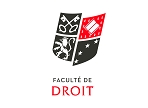FORMATIONS |
Fiche détaillée d'un cours
 | International Criminal Law | ||
2023-2024 | FrFaculté de Droit - Lille et Issy-les-Moulineaux
(
FLD
)
| ||
Code Cours : | 2324-FDL-LAW-EN-4017 | ||
| Niveau | Année de formation | Période | Langue d'enseignement |
|---|---|---|---|
| S2 | FrAnglais |
| Professeur(s) responsable(s) | Michael STRAUSS |
|---|---|
| Intervenant(s) | Pas d'autre intervenant |
- Ce cours apparaît dans les formations suivantes :
- Faculté de Droit Lille - Master 1 DIE Organisations Internationales et Européennes (parcours bilingue) - S2 - 2 ECTS
Pré requis
The student should successfully have followed a course in International law and have a good command of the English language.
Objectifs du cours
At the end of this course, the student should be able to understand the structure, sources and major rules of international criminal law and be able to analyse important cases of international criminal jurisprudence.
Contenu du cours
This course on international criminal law will examine the state of international criminal law primarily in respect to the conditions under which it is (and can be) applied for the prosecution of individuals for the so-called ‘core crimes’ of genocide, crimes against humanity and war crimes. In the process of doing so the major concepts and sources of modern international criminal law and relevant forms of jurisdiction and enforcement will be discussed.
As a special subject in this course we will review International Criminal Law in respect to ‘Command’, currently re-baptised, ‘Superior’ Responsibility. The topic will be examined and discussed on the basis of the jurisprudence, in particular of the International Criminal Tribunal for the Former Yugoslavia (ICTY) and the International Criminal Tribunal for Rwanda (ICTR). The purpose of these seminars will be to acquire a better understanding of this important principle as applied in (recent) jurisprudence. The subject matter is, e.g., of considerable importance for Prosecutor v. Radovan Karadžic,which has resumed on 13 April 2010 as well as for Prosecutor v. Ratko Mladic, started on 3 June 2011 before the ICTY in The Hague. The developments at other (International) courts and tribunals, including the International Criminal Court (ICC) will be studied and discussed during the course.
Modalités d'enseignement
Organisation du cours
Effective presence in class: 24h
Self-learning / e-learning: 32h
Personnal work and preparation: depends on the student (8h min)
Total working time: 64h
Participation of the students during the classes is presumed (and is assessed).During some of the second hours of the lectures students will be asked to present a short report on relevant selected topics; this report will be part of the final mark. There will be a written assignment
Méthodes pédagogiques
Évaluation
Examen : coeff. 1
Ressources internet
I will send documents directly to students by way of the intranet and advice to make use of the following internetsites:
- For the International Crininal Tribunals: www.un.org/icty and www.un.org/ictr
- For the International Criminal Court: www.icc-cpi.int
- or: http://www.haguejusticeportal.net/ (referred to as HJP), and for relevant domestic jurisprudence: http://www.internationalcrimesdatabase.org
* Informations non contractuelles et pouvant être soumises à modification


















































































